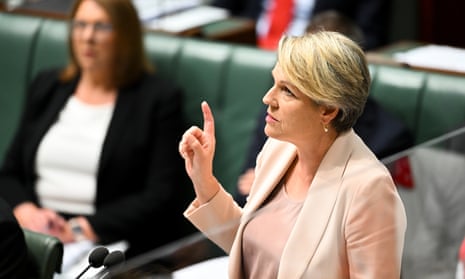Frontbenchers unleash on party for signalling they might vote with Coalition to stymie reform of safeguard mechanism.

Wed 15 Feb 2023 20.47 AEDT
Last modified on Wed 15 Feb 2023 20.52 AEDTAfter the Greens signalled they would use the looming parliamentary negotiation to pursue the party’s long-sought ban on new coal and gas, a number of Labor frontbenchers used question time to launch a pre-emptive strike, warning both the Greens and the Coalition against sabotaging emissions reduction efforts.
While the climate change minister Chris Bowen – who will spearhead the safeguard negotiations – struck a more conciliatory tone about the Greens, frontbenchers Tanya Plibersek and Madeleine King unleashed in the parliament.
“We remember what the Greens did in 2009 when they failed to support the carbon pollution reduction scheme,” King, the federal minister for resources, said. “What they did is teamed up with the Liberals and the Nationals opposite to make sure there was no action on climate change nearly 13 years ago.”
Plibersek, the environment minister, said “sabotaging” climate action was “no surprise” from the Coalition, but Greens members “would actually be shocked to see Greens members of parliament getting ready to sit next to Peter Dutton and Barnaby Joyce to vote against action on climate change … against a safeguard mechanism”.
The Greens have been signalling for months they want the Albanese government to stop new coal and gas projects. Labor says it has no electoral mandate to do that, and that new developments would be allowed with initial emissions limits set at “international best practice”.
While some members of the government went on the offensive, the Greens environment spokesperson, Sarah Hanson-Young, defended their position in a speech to a climate integrity summit hosted by the Australia Institute. She said the minor party had made “an offer, not an ultimatum”, and there were several ways the government could protect the environment while stopping new coal and gas developments.
They included backing a Greens bill to amend national environment laws to introduce a climate trigger that would require the environment minister to reject new fossil fuel projects that emit more than 100,000 tonnes of CO2 a year. “They would be treated the same way as nuclear projects are treated under the existing act,” she said.
Hanson-Young said a climate trigger would also help address the impact of climate change on Australian wildlife, noting Plibersek had set a target of zero new extinctions of native species. She cited the International Energy Agency, UN secretary general António Guterres and the world’s scientists as saying there could not be new fossil fuel projects if the world wanted to limit global heating to the level agreed in the landmark Paris agreement.
“The government should be going down this path, and the Greens’ open offer on the safeguard mechanism is another incentive for them to do so,” she said.
Given the Coalition has ruled out supporting Labor’s overhaul of the safeguard mechanism – a climate policy promised to cut industrial emissions – Labor will require the support of the Greens in the Senate.
Toughening the safeguard regime will be a critical component of meeting the more ambitious climate targets the Albanese government legislated last year. The government wants the reforms in place by July, and business is urging the parliament to move past the climate wars that paralysed policy action for more than a decade.
An ongoing point of contention over the scheme is how much of the emissions reduction would be made directly by industry, and how much would come from carbon offsets, which allow industry to pay for cuts elsewhere and claim them as their own. The widespread use of offsets have been become controversial following allegations that some projects lack integrity.
An analysis released on Wednesday by the consultants RepuTex, which modelled Labor’s climate policy before last year’s election, estimated up to three-quarters of cuts by 2030 would be made through onsite cuts by polluters, with carbon offsets playing a lesser role.
Late on Wednesday, there was a further tactical escalation. Labor pushed its signature Housing Australia Future Fund bill through the lower house, despite the reservations of the Greens - whose support they will require in the Senate to pass the legislation.
The Greens had sought negotiations with the government for more funding for affordable and social housing, plus support for renters. But in a move that surprised the minor party, the government instead rammed the bill through the House without amendment.
That led to a situation where the four Greens MP left the chamber and abstained from voting, with housing spokesperson Max Chandler-Mather saying they were reserving their position.
Most Coalition MPs simply didn’t attend the chamber for division votes, while those physically present decided not to vote either. A notable exception – Liberal MP Bridget Archer, who supported the government in getting the bill through. The final vote passed ‘on the voices’, with no formal division called as there were no votes opposing it.
Chandler-Mather said the Greens wanted to negotiate “in good faith” and decided not to oppose the bill today, but accused the government of a “their way or the highway” approach. “We’re certainly concerned by the behaviour of a government that seems to think that it is above democracy,” he said.
No comments:
Post a Comment